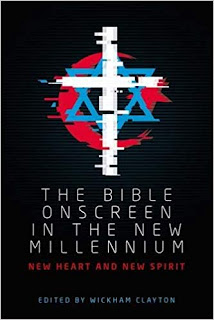 El Cant Dels Ocells
El Cant Dels Ocells means
Birdsong, but there's barely a bird to be seen, let alone heard. It's also about the three kings, but their royalty is similarly silent. This is perhaps the least monarchical depiction of Jesus' royal visitors that I can recall, including those in Pasolini's
Il vangelo secondo Matteo.
Pasolini's film has clearly had great influence on
Birdsong's director Albert Serra. The starkly beautiful black and white photography, the use of ordinary looking actors and the stripped down feel are all very reminiscent of Pasolini's masterpiece. There's even an angelic figure, portrayed by a young woman, wearing a white dress that looks like it was made from a sheet.
Yet Serra dares to go further still. As iconographic as his images are, he humanises the three kings further than Pasolini ever dared. They bicker over which way to go, each trying to nudge the others into making the decision so they can escape blame if the plan fails. They hide from the rain, put their quest on hold to go for a swim and they even seem to get lost at one point. They meander their way around the opening half of the film as if their only hope is that sooner or later Odetta will launch into "Sometime I feel like a Motherless Child". But this time she never does.
The film, with its long, static takes is reminiscent of the style of another great Italian, neorealist,
Roberto Rossellini. Rossellini believed such takes created the most genuine films. Not only is the footage shorn of any artificial, and potentially manipulative, editing, but it also serves to remind the viewer from time to time that this is just a film. A reconstruction, not the real thing.
The result of the Serra's long static takes, beautiful compositions and minimal soundtrack is not unlike viewing a series of paintings in a gallery. Serra treat his audience to incredible image after incredible image, somehow investing each with such meaning from so little.
So low key is the film's aesthetic that the story's most iconic moment creeps up without you really noticing. When the kings finally arrive there is no crowd of curious onlookers. The holy family are on their own; their visitors lacking in an entourage. It's a genuine moment of earthly royalty encountering divine royalty without the pantomime that usually accompanies such encounters.
Yet for all it's demystifying of the royal trio, the film still leaves them shrouded in mystery. We know not what motivates them and drives them on their pilgrimage. And somehow the lack of an answer only drew me into the film more. It's very much in keeping with the transcendental style of film typified by directors such as Bresson and Dryer - the spirituality which permeates the film does so almost because of its meditative pace and lack of action.
El Cant Dels Ocells (Birdsong) is an incredibly slow film in which nothing happens. And I feel all the better for having seen it.
Labels: Birdsong, Nativity - Mary Joseph
 The History Channel's miniseries The Bible finally arrives in the UK tonight tucked away on Channel 5. I've written a few bits and pieces on some of the episodes here, but my main review of the series as a whole has just gone up at Ken Morefield's 1 More Film Blog. Ken was kind enough to provide me with review copies of the DVDs. I may post a few more thoughts on the episodes as the series progresses.
The History Channel's miniseries The Bible finally arrives in the UK tonight tucked away on Channel 5. I've written a few bits and pieces on some of the episodes here, but my main review of the series as a whole has just gone up at Ken Morefield's 1 More Film Blog. Ken was kind enough to provide me with review copies of the DVDs. I may post a few more thoughts on the episodes as the series progresses.













